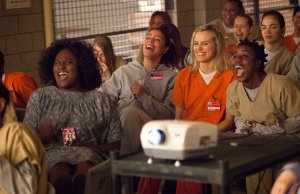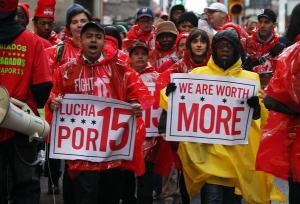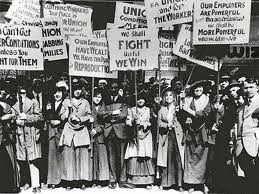If my Facebook feed is any indication, Orange is the New Black is this summer’s most intriguing and talked-about new show. And as you might expect for a popular new show that broaches complex and controversial topics like life inside a women’s prison, its earned its share of critics. Despite that, having some prison experience under my belt, I can comfortably say that Orange gives us, by far, the most accurate, compassionate, and insightful on-screen peek of life behind bars to date. And given the state, and ever-broadening reach, of the modern Prison-Industrial Complex, it’s right on time.
Orange is the New Black is a pseudo-fictional Netflix series based on a memoir of the same name. It follows Piper Chapman (real-life: Piper Kerman), a well-educated, thirty-something white woman from upper-middle class New England, on her 15-month journey through a Litchfield Federal Correctional Institution, a minimum security federal prison. It’s a fish-out-of-water story, and we get to tag along as Piper struggles to find her way in a place foreign to her, and to most of us for that matter. Her experience may not be representative of the general prison population – an overwhelming majority of Americans serving time are people of color, from underprivileged backgrounds, or both – but her story provides a timely, and much-needed, commentary on life in a modern American prison.
I spent two years in the Georgia Department of Corrections (as well as stays in a various city and county jails), so I can relate to much of what Piper has to endure. While the book paints a slightly more realistic picture of prison life, the show manages to capture the essence and feel of prison, but more importantly, it shows us that these women, hardened criminals and repeat offenders, are more like you and me than most of us would care to admit. These are real women, with real lives on the outside, with real families, hope, dreams, futures, and they face and endless series of struggles, frustrations, disappointments, and isolation without giving up and, sometimes, they even manage to have a little fun.
The prison industry thrives on robbing people of their identities and convincing the public they’re monsters who deserve to live in cages for years, decades, even the rest of their lives. The United States alone incarcerates around 2.5 million people, with 1 in 15 Americans under some form of correctional supervision. The system depends on these human being viewed as abstract, less than human, and never seen unless to frighten us. Orange is the New Black peels below the surface to show us women who, far from being monsters, could be our mothers, our sisters, our daughters, our neighbors, our friends. This is not Oz. This is what prison is really like.
White Privilege Doesn’t End Behind Bars
Some critics of Orange is the New Black (both the book and the film) find it easy to bash Piper because she doesn’t “look like” the typical prisoner. Yes, Piper enters prison an uptight, upper-middle class white woman with a fancy degree from a posh college. She managed to. It’s absolutely true, to use one critics example, that a woman of color likely couldn’t turn such an experience into a best-selling book and a popular television series. However, there aren’t many white middle-class women who could have, either. The book and the series are based on Piper’s experience in prison, and there’s nothing wrong with that. Everyone’s experience in prison is unique, and it’s never easy. Despite where she comes from, Piper’s shares stories about women from a wide range of cultures and backgrounds, not just her own. I think that’s why her story has been successful and found such a receptive audience.
That being said, Piper seems well aware that her white skin put her at an advantage. Prison serves as a twisted, madly exaggerated microcosm of real-world social relations. Race and class play strongly into an individual’s prison experience. In the very first episode, the fact that Piper was given the opportunity to self-surrender (and in the book she spent six, yes six, years on the outside after being sentenced), while the less fortunate stay in jail from the time they’re first arrested, is a shining example of this difference, and just the first of many.
While I come from a lower rung of the socioeconomic ladder, my own experience in prison speaks to the existence of white privilege in correctional institutions. I was assigned comfortable inside jobs in the law library or assisting the  counselors and administration, while my less fortunate fellow inmates, many of color or without the benefit of a high school education, were stuck outside swinging a bush-axe or wading hip-deep in raw sewage and swamp water in the south Georgia heat. None of us were paid for our work, which benefited the state handsomely, but there was no doubt a social order to who was assigned certain jobs.
counselors and administration, while my less fortunate fellow inmates, many of color or without the benefit of a high school education, were stuck outside swinging a bush-axe or wading hip-deep in raw sewage and swamp water in the south Georgia heat. None of us were paid for our work, which benefited the state handsomely, but there was no doubt a social order to who was assigned certain jobs.
While prison wasn’t easy for me, I was more fortunate than some fellow inmates. While the series glosses over some of these issues, it was impossible not to notice that when I headed to visitation, to the prison commissary, or heard my name during mail call, some of my neighbors sat silently, despondent, vainly hoping to hear their names, a reminder that someone outside remembered.
As Kerman mentions in the book, many inmates with shorter sentences, or whose sentences were winding down, often saw their fortunes dramatically improve. Somehow, the people who had mysteriously forgotten where their loved ones had disappeared to remembered now that they were about to return home. Funny how that happens, we all though. And it happened a lot, and it never went unnoticed.
In Piper’s case, one of the counselors shows a definite preference for her, noting that they’re both “northerners” (a euphemism for “white” I presume). In fact, he appoints her to a prisoners’ advisory council, much to the chagrin of the other inmates, who fought to be elected and for which she did not campaign.
In the council’s first meeting, while the other inmates express concern for quality-of-life issues like more comfortable pillows, a better selection of commissary items, or access to a wider selection of books in the library – issues that very much concern real-life inmates – Piper raises more substantive issues such as re-establishing a GED program, re-opening the outside running track to improve the mental and physical health of the inmates, or legal counseling for inmates.
One critic framed this as the show presuming that “only white women have the wherewithal to understand and contest prison conditions.” I don’t see it that way. These are all issues that I’ve heard fellow inmates discuss and complain about repeatedly. I’m certain they’ve crossed the minds of Piper’s more experienced fellow inmates as well. However, Piper comes into all this from a privileged background. She is no doubt accustomed to feeling empowered and having her opinion taken seriously. To be blunt, it seems Piper is the only inmate on the council, and maybe in the whole prison, naïve enough to believe that the staff gives a damn what the inmates want.
This proves to be exactly the case, as the advisory council is soon revealed as nothing more than a not-so-elaborate ruse. Such schemes, which convey the appearance that the administration cares what the inmates think are common in correctional institutions. They work surprisingly well, at least in keeping prisoner self-organizing to a minimum, especially considering that most of us understood they’re nothing more than a pacifier, more for the benefit of the people monitoring conditions on the outside than anything else.
We’re Not So Different After All
Living face-to-face with women from starkly different backgrounds, Piper quickly (perhaps too quickly to be believable) realizes that she’s no so different from them after all. The show misses a great opportunity to show Piper make some personal growth here. When she tells her mother, who is appalled that her daughter is forced to live among such hardened criminals that she is, in fact, “just like them” it seems not at all genuine. Still, it soon becomes obvious to the viewer, that these women aren’t monsters or violent psychopaths. And while Piper seems under the impression that most of the women are there, like her, because they made “bad choices,” the show suggests otherwise.
It’s rarely just a matter of “bad choices” that land men and women in prison. People or color or those of us born into poor and impoverished communities are rarely presented with “good choices” to begin with. Many of the women at Litchfield aren’t incarcerated for bad choices, but because of bad circumstances. And once we find our way into the corrections system, even after we’re free from prison or parole and probation, we find ourselves in the grips of a revolving door from which few of us ever manage to escape.
Piper’s bunkmate Miss Claudette was brought to America from Haiti as a child, hoping for a life of opportunity, only to find herself trapped in a human trafficking operation where she’s expected to pay for her freedom by working for her new caregivers. She later ends up running that same operation, which eventually lands her at Litchfield.
Another young woman finds her dreams of a successful track and field career and a full scholarship to any school she wants derailed, not simply because of a bad choice, but because she felt compelled to take certain risks to be accepted by her peers (or, as it turns out a guy, which comes across as grossly sexist, but nonetheless authentic).
 Most characteristic of these unforgiving circumstances and the revolving-door back into prison is Taystee, the young woman who works in the prison library. Just weeks after her release, she finds herself back at Litchfield, not because of bad choices, but because she had no real choices to begin with. Not only is she sent out of prison with no job training or skills, and no preparation for life in a hostile environment, she has no place to live and no way to support herself. Add to that an unsympathetic probation/parole officer with unreasonable expectations, the impossibility or finding work with few skills and the added stigma or a criminal record, insurmountable fines and fees that the state deems more important than rent and food (yes, I’ve had them tell me they need to be paid first more than once), and loss or abandonment of friends and family, and our society has created the ideal formula for a cycle of perpetual recidivism.
Most characteristic of these unforgiving circumstances and the revolving-door back into prison is Taystee, the young woman who works in the prison library. Just weeks after her release, she finds herself back at Litchfield, not because of bad choices, but because she had no real choices to begin with. Not only is she sent out of prison with no job training or skills, and no preparation for life in a hostile environment, she has no place to live and no way to support herself. Add to that an unsympathetic probation/parole officer with unreasonable expectations, the impossibility or finding work with few skills and the added stigma or a criminal record, insurmountable fines and fees that the state deems more important than rent and food (yes, I’ve had them tell me they need to be paid first more than once), and loss or abandonment of friends and family, and our society has created the ideal formula for a cycle of perpetual recidivism.
Meth-mouth, Jailhouse Religion, and Lesbians
Orange is the New Black tries to reach beyond the stock characterizations of most social and racial stereotypes. I’m sure that’s not always easy to do on television. Still, as the show falls into the trap of tired clichés and television tropes in its handling of poor rural white women, it becomes almost unbearable..
Enter Pennsatucky, the leader of Litchfield’s “white trash” clique, all of whom suffer a tragic, and very visible, case of meth-mouth. Piper soon finds herself at odds with Pennsatucky, whose most believable trait is that horrendous nickname. Pennsatucky is deeply religious, which is not rare in jail or prison. Sadly, her “followers” are portrayed as mindless, unthinking zombies whose “religion” is a cartoonish brand of extreme, borderline psychotic, fundamentalist Christianity that would make Pat Robertson blush.
Religion plays an important role in the lives of many incarcerated persons, but it’s almost always a serious matter. Some folks find what we called “jailhouse religion,” forgotten as soon as they stepped back into the free world. Rarely, however, is it as one-dimensional as what we see with Pennsatucky. It borders on offensive when Pennsatucky suggests baptizing a reluctant Piper in a filthy dish sink in the prison kitchen.
I’m not sure the line of reasoning here, but it’s disappointing that the show goes to such lengths to develop interesting and complex characters elsewhere, but presents poor white women as uneducated fundamentalist religious zealots. One can’t help but feel that poor women from Appalachia or religious people are the butt of a joke for the entire second half of the series. Piper’s pompous and incredibly shallow retort “I don’t believe in religion, I believe in science,” failing to accept that the two could ever co-exist, only makes matters worse.
The show earns back a few points for the depth of its only other outwardly (thought not nearly as outspoken) religious character, a Roman Catholic nun serving time for breaking into a military base to protest US war and foreign policy, something that happens more than most people realize. Not only does “the Sister” (based on a real character in the book) drink hooch with the other women and smuggle contraband (sneaking food out of the kitchen qualifies), but her character shares some deep and meaningful moments with the the prison’s only trans-woman, conversations that likely wouldn’t be possible with anyone else.
Orange has already earned high marks for its handling of LGBT issues, and I can’t find much to pick at. This is a women’s prison, so there’s bound to be lesbianism. And it’s also television, so they’re going to squeeze that for everything they can. Unfortunately, at time it feels like every inmates at Litchfield is in, or freshly out of, some sort of lesbian relationship. Yes, it happens, but it doesn’t happen that much.
Litchfield’s sole transgender resident, Sophia, breaks from Hollywood’s traditional treatment of trans-issues, going beyond cosmetic issues, digging into the deeper issues of being a woman living in a man’s body – and the frightening ramifications being forced to go back. We also see what it means for a married man to become outwardly transgender after having a child and how that affects a family, including Sophia’s wife and son. It forces us to deal with the struggles transgender people face everyday, struggles that most “straight” people probably never consider. This is by far one of the show’s shining moments.
In an extraordinary bizarre plot twist, made believable only by the fact that it actually happened, Piper ends up in the same facility as her former lesbian lover and partner in the drug trade, Alex. And while she is now engaged to a man, Piper makes it perfectly clear, much to the discomfort of her family, that this lesbian relationship was not simply a “phase,” but it part of who she is. The show, and Piper herself, go to great lengths to provide an unconventionally complex view of the fluidity of sexual orientation. When Piper’s friend suggests she may be seduced into “turning gay” again while in prison, she fires back with an almost academic speech about Kinsey scales and sexual spectrums that might help open a few closed minds.
The book also shows a solid understanding of the intricacies of lesbianism and several inmates repeatedly stress the difference between “real lesbians” and women who are “gay for the stay,” painting a striking parallel to sexual relations in male institutions (which are commonly sterotyped, but rarely discussed with any sort of serious thought).
CO’s Have Unions, but Who Does the Work Around Here?
The corrections officers (CO’s) and administrative staff at Litchfield are frighteningly realistic. So much so, many of them could be easily switched out with real-world staff I encountered in the Georgia Department of Corrections. There’s illicit prison sex, some of it voluntary, some coerced in exchange for drugs or other contraband, and some forced. This all happens in the real world and it’s all rape, since prisoners in custody aren’t legally able to give consent. Of course, just like in the show, the administration shies away from calling it rape and it’s almost never reported.
Just as disturbing, especially for someone forced to silently endured it for years, is the psychological, emotional, and physical abuse and the arbitrary enforcement of rules that may, or may not, actually be on the books (we never knew since inmates are rarely briefed on rules and almost never on their rights). Many CO’s seem to take a sadistic pleasure in wielding absolute power over inmates. Abuse almost never goes reported, and even when it does, it’s the inmates word against an agent of the state. I’m sure you can guess the outcome of that. Often when inmates are brutally beaten by staff, sometimes in retaliation for organizing a strike or complaining to the wrong person, they are placed in isolation (“the hole”) until they heal, as insurance that the general public won’t see them in that condition. CO’s don’t hesitate threatening to “hide” problem inmates.
Few staff members at Litchfield come away unblemished. While there are a few kind souls who find their way into jobs at corrections facilities, they rarely last, or quickly fall in line with their corrupt and power-stricken cohorts. Orange shows characters in varying stages of this transformation, the ultimate being a deputy warden who embezzles money and the superintendent who will bend or break any rule, using inmates as his personal pawns, in a power grab for her job. It quickly becomes clear who the true criminals are in this scenario, and just like the real world, it’s not always the folks serving sentences imposed by a judge.
Power relationships in prison are about dehumanizing the inmates and keeping them in a state of fear, or at least confusion. This process is nicely summed up in a scene where the superintendent instructs a junior officer on how to address the inmates: “Call them inmate!” he says. “It reminds them they’re not really people…They’re not like you, you’re a woman.” That line may have been written for television, but I guarantee that it, or something very much like it, is been spoken behind the walls of almost every jail and prison in this country.
This is further explored in the way staff treats the death of Trish, an inmate addicted to opiates, who dies from an overdose after taking all the drugs Officer Mendez coaxes her into selling. Not only does the staff willfully fail to look into the clumsily staged “suicide” Mendez sets up after finding her body, but he makes a joke about it later without stopping to think it might be considered inappropriate in “the real world.” Such lack of concern or respect is commonplace because, as  the show suggests, real world corrections officers don’t see inmates as human. They can’t if they expect to spend any amount of time in that job.
the show suggests, real world corrections officers don’t see inmates as human. They can’t if they expect to spend any amount of time in that job.
It’s hard to tell the Orange’s take on labor issues, but it’s clear that the CO’s and staff aren’t respected as workers, despite having union representation. Which I always found amusing when confronted with CO’s in real-life, because all the work that gets done in prison is done by the inmates. Orange makes this clear in the very first episode, when one of the characters says “if we don’t do it, it won’t get done.” This made me crack a smile, because there’s so much truth to it. Prisoners do the cooking, serve the food, clean everything, do the laundry, wash the dishes, fix anything that’s broken, cut grass and landscape, even fill out paperwork and teach classes. And at Litchfield, they even drive the CO’s and other inmates around the facility (something I didn’t believe actually happened until I read it in the book).
The show makes it clear that inmates are paid poorly for their work and Piper, assigned to electrical maintenance, seems to get shocked every time she’s near a wire, reflecting the poor safety conditions. The book goes into even more detail, complaining about Unicor, a government-owned company that makes a tidy profit selling products manufactured by prisoners. Unfortunately there’s not much said about what prisoners can do to resist these conditions, although one administrator does comment that the advisory council mentioned earlier is basically a prisoners union. Let’s hope that topic is explored in future episodes, especially considering the increase in self-organization of hunger strikes and work stoppages in prison systems across the country recently.
What Happens Next is Up To Us
When Piper’s finance Larry goes on the radio and reveals information about Piper’s fellow inmates that she insists hurt them, he doesn’t miss a beat responding that, “they’re just criminals.” Sadly, that’s not fiction. It reflects the attitudes of many Americans toward presently and formerly incarcerated persons, with no regard for their stories, what they’ve had to endure, where they’re from, or the fact that they’re only human. It’s easy to forget that we all make mistakes, especially when we have institutions filled with people who made much “worse” mistakes. But as those institutions fill up with more and more people, we find ourselves forced to make a choice.
Who decides which mistakes are worthy of being put in a cage, ripped from our families, robbed of our lives, and stamped forever with the stigma of a convict? I don’t think it’s up to me to make that choice. I don’t think it should be up to anyone. Hopefully shows like Orange is the New Black, that show human beings, not monsters or depraved maniacs, on the inside of those walls, will help people realize that maybe those choices aren’t up to them either.
But more than that, it’s going to take some deep soul-searching as a society, to decide if we’re ready to deal with the consequences of criminalizing huge portions of our neighbors. We’re not going to shut down all the prisons and free all the inmates, even if that were the right thing to do. But there is something we can do. We can write to people to let them know they’re not forgotten. We can visit them. We can fight to make sure that, as long as they’re stuck there, at least they don’t have to be tortured. That they’re treated like we would want to be treated. Like we’d want our children to be treated. Let’s start there, and see where it takes us, because what we’ve got right now, it’s not working. And it’s only going to get worse until we step up and say, “Enough!”
Jeremy Galloway is a writer and activist. He spent two years in prison much like the one Piper was sent to for a non-violent charge. The United States has the highest population of incarcerated people, total and per capita, in the world. The US prison population, counting federal, state, and county jail inmates, currently stands at well over 2 million. That number has ballooned since the war on drugs began and it shows no sign of slowing down. Far from being a deterrent, incarceration creates an endless cycle of repeat offenders and destroys inner-city and poor rural communities, ensuring that future generations will continue the trend. Prison is not only a terrifying and sometimes dangerous, it is ridiculously boring, isolating, and frequently leads to depression and lasting mental illness. There’s a list of places you can get involved to make a difference below, but most importantly, you can help by making sure that the men and women behind bars know they’re not forgotten and that people on the outside care about what happens to them. Contact Jeremy at jeremy.k.galloway@riseup.net
Georgia Justice Project – http://www.gjp.org
WriteAPrisoner – http://www.writeaprisoner.com
Prison Book Program – http://www.prisonbookprogram.org
Books Through Bars – http://www.booksthroughbars.org
Legal Services for Prisoners with Children – http://www.prisonerswithchildren.org
Prison Policy Initiative – http://prisonpolicy.org
Real Cost of Prisons Project – http://www.realcostofprisons.org
Restorative Justice Online – http://www.restorativejustice.org
Prisoner Hunger Strike Solidarity – http://www.facebook.com/PrisonerHungerStrikeSolidarity
Campaign to End Prisons for Profit – http://www.facebook.com/CampaignToEndPrisonsForProfit
Anarchist Black Cross Federation – http://www.abcf.net/












